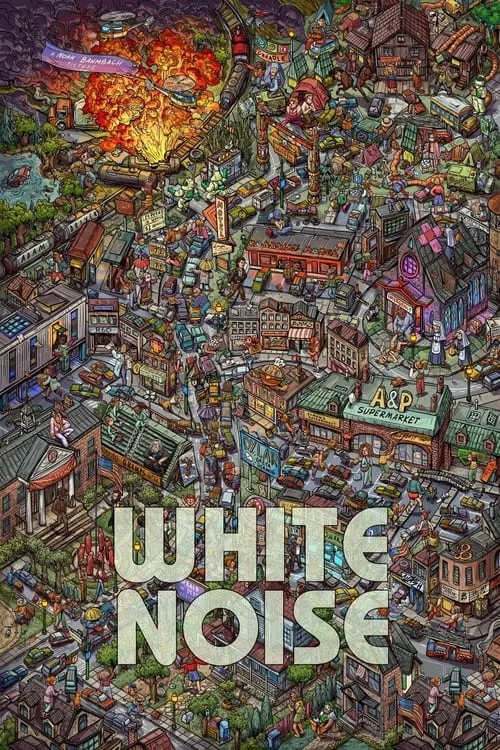White Noise

Plot
In Don DeLillo's 1985 novel of the same name, adapted for the screen by Noah Baumbach in 2022, 'White Noise' delves into the existential crisis of Jack Gladney, a middle-aged professor of Hitler studies. Set in a Midwestern American university, The-College-on-the-Hill, Jack's life is seemingly stable, having married his Polish mistress, Babette, and adopting her four children, creating a blended family with his own three biological children. However, the façade of a picture-perfect life crumbles when a catastrophic rail car accident unleashes a deadly chemical spill, aptly known as the "Airborne Toxic Event." As the news of the impending environmental disaster spreads, Jack's household descends into chaos, while panic grips the community. With the toxic event mere hours away, Jack's children, Denise, Steffie, and Wilder - along with his stepchildren, Heinrich and Inge - grow increasingly anxious, sensing the gravity of the situation. Jack's own sense of impending doom and dread, fueled by the uncertainty of his ability to protect his family, drives him to his breaking point. This is the moment when Jack is forced to confront his greatest fear, his own death. The Airborne Toxic Event serves as the impetus for Jack's introspection as he navigates the existential and environmental disasters unfolding around him. The character of Jack is portrayed by Academy Award-nominee Adam Driver, who brings forth the complexities of this intellectual and emotionally troubled protagonist with remarkable nuance. Jack's introspection becomes an exploration of what it means to be human, the nature of mortality, and the search for existential meaning in the face of catastrophe. He begins to question his very existence, seeking refuge in his academic pursuits - particularly those concerning Hitler studies - to momentarily escape the looming threats. As Jack navigates the crisis, he turns to his 'Course in the Extinction of the Human," an abstract intellectual exercise aimed at understanding the 'event' that brought humanity to its current state. His obsession with Hitler studies mirrors Jack's existential predicament, as both are a preoccupation with understanding catastrophe. DeLillo's novel masterfully subverts the boundaries between the intellectual and the personal, highlighting the fragility of human existence amidst the overwhelming presence of ecological and existential threats. The supporting cast of Jack's family members is equally well-developed. Emma Stone, portraying Jack's wife Babette, skillfully reveals a sense of desperation and determination that underscores her strength and resilience. Jack's daughter, Denise, played by Greta Gerwig, embodies a deep emotional intelligence that provides a much-needed respite from the chaos around her. Together, these performances form a poignant family portrait that underscores the human cost of environmental disasters. In the midst of panic and uncertainty, Jack discovers the significance of his connection with Babette, an intellectual and artistic soul, as they share a deep longing for the meaning of life. Their conversations become a reflection of Jack's inner turmoil. DeLillo's exploration of this bond, which transcends conventional notions of love and companionship, underscores the resilience and interconnectedness of human relationships in the face of catastrophe. 'White Noise' delves into complex and timely themes, echoing DeLillo's astute social commentary. Through Jack's journey, the film highlights the fragility of human existence in an age of catastrophic events and existential crises. Jack's existential inquiry mirrors the fears and anxieties of a global community struggling to come to terms with ecological threats and global uncertainty. The 'White Noise' is an aural metaphor representing the noise of the modern world - an unending torrent of information and distraction, threatening to overwhelm us. Ultimately, the film presents a poignant examination of our existential condition and what it means to be human.
Reviews
Recommendations




